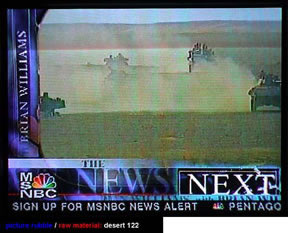
RAINER GANAHL
"Picture rubble / raw material"
is what it is: photographed television images and freeze-frames of electronic
footage released from news organization, media monopolies and the Pentagon.
The content of the images is the current "War on Terrorism:"
the hunt for Bin Laden and the bombing of Afghanistan. Frequently, what
we see in the "live,", "in depth," or "special"
reports are bombed buildings, tanks, airplanes, rubble, accompanied by
the talking heads of the spin doctors, who explain, justify and speculate
on this war, its means and measures.
While constitutional rights are suspended and massacres and war crimes
are shown on TV, dissent of any kind risks being interpreted as 'anti-American'
and thereby sympathetic to "terrorism." Terrorism has become
the new magic word in domestic and international politics. The victorious
images help to cement a view that monopolizes and streamlines public and
private opinions. Simplified and stereotypical reasoning predominates,
while the more complex and systemic political causes of the crisis remain
ignored. In this project I want to capture and freeze some of the TV-pictures
and keep them as a sort of public/private war archive for future viewing.
On their own, these images are fascinating: exotic landscapes and faces,
stunning violence and misery, high tech and primitive military equipment
and operations, veiled women, Bin Laden replays, "collateral damage,"
chaotic masses and protesters, brand name journalists, and regional experts.
Some images come from the battlefield, others originate in the studios
of prime time infotainment production.
My interest lies also on the interface of these electronic/digital images.
How are such images released? They are typically cleared by the Pentagon
or other (self-)censoring agencies. Stories packaged and served up to
our screens. The final pictures are composed of multiple layers of windows,
scrolling and fixed texts, mixed with a variety of logos. In fact, nearly
every broadcast, front line report or talk show special has a specific
name or brand: "A Region in Conflict; War in Afghanistan; War on
Terrorism; Update on the Taliban; The Hunt for Bin Laden; Anarchy in Afghanistan;
America Strikes Back; Who is Next; Live from Islamabad with Christiane
Amanpour; The Military Campaign" etc. There are even subtitles to
these titles and again sub-subtitles: "CNN Newsnight; Live; The Fate
of Saddam; New York; Washington." Next to these fixed titles, main
network logos and the logos of the current programs, we also get generic
news headlines scrolling across the screen at the bottom of the picture.
Photographed, freeze-framed, and converted into low-resolution pictures,
we become even more aware of the ironic and contradicting juxtaposition
of images and info-bites: Sports scores next to images of massacred Afghans;
the nation's "third largest petroleum company" with maps of
upcoming targets; "Human cloning researcher defends work" with
starving and freezing refugees; or "Capital Gang" with "7
killed in Palestine." To these compressed and text-laden images I
add another layer of text including the project title and a keyword. The
keywords are rather naive and oriented along a phenomenology of simple
appearances that ignores the seriousness of the facts behind these images.
They provide a false sense of order and simplicity to these catalogued
images of death, destruction and enforced justification.
This media war-material is made available here through a random slide
show in order to keep it available beyond the events which are moving
and altering the TV-output constantly. The discrepancy between the sophisticated
digital image of the satellite or cable info-world and the simplicity
of the area that is bombed out in a remote zone renders any questions
for justification irrelevant. It even destroys the possibility for an
accurate analysis. Those in charge of media, defense and oil monopolies
are unfortunately also in charge of "the truth" and the power
to define events and people.
Rainer Ganahl, New York, December 5, 2001
HOW TO LOCATE
VISIT ON THE WEB